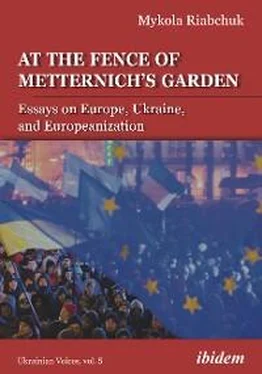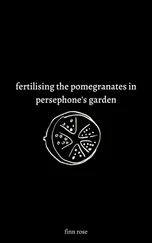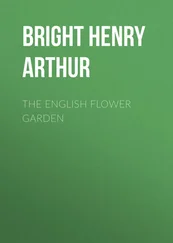In brief, the myth consists of three major narratives. The first one blurs and washes away any difference between two very different historical entities—Ruś and Russia. The linguistic similarity is successfully converted into a historical, geographical and political similarity and, eventually, sameness. By the same token, modern Romania can be identified with ancient Rome, and Britain identified with Brittany. The second narrative grants the modern name Russia, coined in the early 18th century, to medieval Muscovy and establishes mythical ties between the Moscow Tsardom and Kyivan Ruś. The fact is, however, that no idea of Moscow’s succession to the Kyiv Ruś legacy could be found in Muscovite thought until the end of the 17th century, when Left Bank Ukraine and the city of Kyiv were taken from Poland and when the Grand imperial myth began to be formed (ironically, by Ukrainian clerics hired by Peter the Great and seeking to enhance their country’s symbolic role as the cradle of the empire). And finally, the third narrative questions the very existence of the Ukrainian (and Belarusian) nations, misrepresenting them as incidental offshoots of the great Russian nation—despite the fact that these ‘offshoots’ came under full Russian control for the first time in their history only at the end of the 18th century, after the partition of Poland.
Any nation is largely built on ‘invented traditions’, and Russia is no exception to the rule. But very few nations center their identities almost thoroughly on historical myths, and very few national myths are so expansive, so militant and, alas, so broadly accepted as ‘historical truths’.
A ‘Russia first’ policy, based on these myths as well as on cynical Realpolitik , seems to be the main if not the only rationale for Western ambiguity about Ukraine and for Western reluctance to treat it as equal to any other nation on the continent, with the same rights, same chances and prospects for EU membership as Albania, Turkey or, say, Bosnia and Herzegovina. It does not mean that unreformed, stagnant, oligarchic Ukraine could and should be admitted to the EU. It means only that such a Ukraine should be rejected for that very reason articulated openly, and not because Russia might feel ‘isolated’ and perhaps ‘unhappy’, as some Western leaders equivocally suggest. “Tough love” (in Heather Grabbe’s words)—this is exactly what Ukraine needs: more ‘love’ for the nation, with clear incentives of future membership, and more ‘toughness’ for the political leaders, who should come in line with their domestic and international obligations.
So far, EU policy towards Ukraine has been nearly as ambiguous and equivocal as that of Ukraine towards the EU, although the reasons for this are different. From such a policy, probably no one can figure out whether Ukraine is barred from prospective membership simply because of its poor political and economic performance, or rather because of the nation’s assumed intrinsic inferiority and congenital Russian vassalage.
Some statements made by EU officials rather deepen the confusion than dispel it. Suffice it to mention Romano Prodi’s notorious remark that Ukraine “has as much reason to be in the EU as New Zealand” (because New Zealanders, in his words, also have a European identity). Or the no less controversial quip by Günter Verheugen that “anybody who thinks Ukraine should be taken into the EU should perhaps come along with the argument that Mexico should be taken into the U.S.” 2
It does not matter that neither do New Zealanders strive to join the EU, nor Mexicans for U.S. accession. And that none of them stage an ‘orange revolution’ to assert their Europeanness. In both exemplified cases, grotesque and essentially absurd arguments were set forth by respectable politicians in such a way as to stultify their potential opponents, to mock and discredit their arguments in advance, and to thereby make any further discussion impossible. In other words, the goal was not to clarify anything whatsoever but just to convert political power into discursive or, as Michel Foucault would have put it, to monopolize the discourse of ‘normality’ and push all opponents beyond that discourse, into the realm of insanity and obsession.
The double standards will probably be ingrained in EU policy vis-à-vis Ukraine, and the duplicity will not disappear, as long as the EU does not decouple Ukraine and Russia and refuses to recognize their absolutely different strategic agendas. The EU still has to decide whether “it can agree in principle to Ukraine being inside the EU while Russia remains outside” [Kuzio 2003: 30]. This cannot come easily, and Ukrainians must recognize that ‘enlargement fatigue’ is a reality in Europe. And that the timing is really bad for their country after the decision to start membership talks with Turkey and the accession of 10 new countries in 2004. For too many Europeans, as Martin Wolf put it, Ukraine and Turkey, by virtue of their size and location, are “twin nightmares” haunting the EU ( Financial Times , 1 February 2005). Too many of them perceive these countries as not just too poor, too big, and too different, but as thoroughly alien, even hostile. Xenophobia is primarily a biological, not a sociological phenomenon. It comes from a basic instinct that can be controlled or not, can be tamed by culture and education, or released and exploited by populist ideologies and political forces.
Ukrainians may be surprised, even exasperated by the fact that the European Neighborhood Policy elaborated by the EU places them in one bag with North African and Middle Eastern countries, but this decision reflects the profound mode of Western thought: all these countries, including Ukraine, are perceived as not really ‘European’, and the name ‘European Neighborhood Policy’ (instead of ‘EU Neighborhood Policy’) is not just a minor political incorrectness but an essential view, a part of the Weltanschauung . In a sense, the Europeans are right: all the profound differences between East Slavonic and Middle Eastern or North African countries notwithstanding, all of them “are involved in a more or less open civil war which seems to be fed by a disagreement on the adoption of Western values” [Langer 2004]. What is common between Morocco and Belarus, Lebanon and Ukraine is that in all of them “the EU is challenged by another spiritual power”—Muslim orthodoxy in one case, Russian ‘Eurasian’/neo-Soviet imperialism in the other.
For many Ukrainians, this is a difficult truth to accept. From their point of view, the ENP rather excludes them from Europe proper than facilitates their inclusion. This not only contradicts Ukraine’s stated strategic goal of full EU membership, but also poses a challenge to Ukraine’s identity, which historically evolved under permanent threat of Russification and therefore made the nation’s alleged ‘Europeanness’ a sort of life belt, a means to legitimize and secure its cultural and political emancipation. The Europeans, who tend to ignore this sensitive issue, simply do not understand its symbolic importance. For many Ukrainians, the denial of Ukraine’s European prospects means a denial, or undermining, of their identity, an implicit attempt to throw them back into the Russian ‘Eurasian’ bag and, worse, to cynically settle relations with Russia at Ukraine’s expense.
From the very beginning, ‘return to Europe’ has been seen by Ukrainian nation-builders as a return to the norm, a fixing of historical injustice and perversion, a healing of a developmental pathology. Such a romantic approach emerged naturally from modern Ukrainian nationalism which, from its very inception in the first half of the 19th century, had to emphasize Ukraine’s ‘otherness’ vis-a-vis Russia [Riabchuk 1996]. This meant, in particular, that Ukrainian activists not just praised the alleged Ukrainian ‘Europeanness’ as opposed to the demonized Russian ‘Asiaticness’; they had volens-nolens to accept the whole set of Western liberal-democratic values as presumably ‘natural’ and ‘organic’ for Ukrainians (yet allegedly ‘unnatural’ for Russians).
Читать дальше












